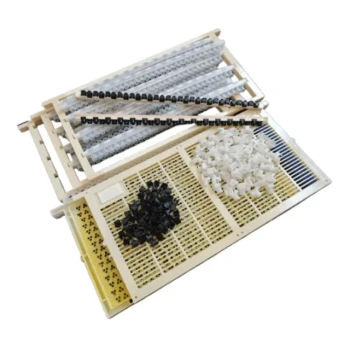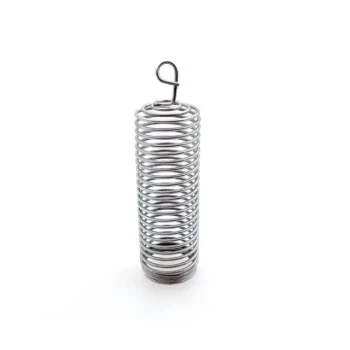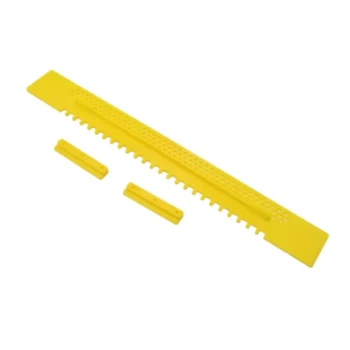At their core, nucleus colonies are the beekeeper's ultimate insurance policy. A nucleus colony, or "nuc," is a small, fully functional bee colony that serves as a living resource bank. Maintaining them provides beekeepers with unmatched flexibility and immediate solutions for the most common and urgent problems that arise in the apiary.
The fundamental advantage of a nucleus colony is that it shifts beekeeping from a reactive to a proactive practice. Instead of scrambling when a hive fails, you have a ready-made solution on hand, saving your colonies, your time, and your money.
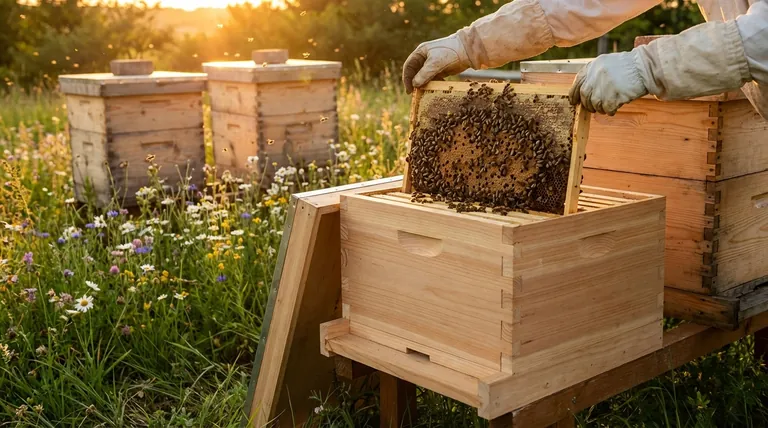
The Strategic Role of a Nucleus Colony
A nucleus colony is not managed for honey production. Its primary purpose is to support the larger, honey-producing hives in your apiary.
What is a Nucleus Colony?
A nuc is a small hive, typically consisting of three to five frames. It contains all the essential elements of a full-sized colony: a laying queen, worker bees, drones, brood in all stages (eggs, larvae, pupae), and food stores (pollen and honey).
A Living Resource Bank
Think of a nuc as a bank of biological assets. At any time, you can "withdraw" resources from it to solve a problem elsewhere. This transforms a potential crisis into a simple management task.
Key Advantages in Apiary Management
Holding colonies in reserve provides efficient, on-site solutions to the most pressing beekeeping challenges.
Rapid Queen Replacement
If a production hive becomes queenless or its queen begins to fail, the clock is ticking. A nuc provides an established, laying queen that can be introduced immediately, minimizing the break in the brood cycle and ensuring the hive's survival and productivity.
Boosting Weak Colonies
A struggling or slow-building colony can be saved by adding a frame of capped brood from a healthy nuc. This infusion of new worker bees strengthens the hive's population and workforce without weakening one of your primary production colonies.
Effective Swarm Management
When a strong hive prepares to swarm, you can prevent the loss of bees by performing a "split." By removing a few frames of brood, bees, and the old queen into a nuc box, you relieve congestion in the parent hive and create a new, viable colony in the process.
Sustainable Apiary Growth
Nucleus colonies are the most reliable way to expand your operation. Overwintered nucs made from your own local, adapted bee stock provide a strong start for new production hives the following spring, reducing the need to buy bees.
Understanding the Trade-offs
While immensely valuable, maintaining nucleus colonies requires a conscious investment of resources and attention.
Resource and Time Commitment
Nucs require their own equipment (nuc boxes), regular inspections, and feeding, especially during buildup or dearth. These are resources and time that could otherwise be dedicated to production hives.
Increased Management Complexity
For every nuc you create, you add another colony to your inspection schedule. This increases the overall complexity of your apiary management, which can be a consideration for beekeepers with limited time.
Higher Vulnerability
Due to their smaller size, nucs are more vulnerable than full-sized hives. They can be more susceptible to robbing by stronger colonies, have a harder time defending against pests like wax moths, and are less resilient to extreme weather.
Making the Right Choice for Your Goal
Integrating nucs into your apiary is a strategic decision that pays dividends in resilience and control.
- If your primary focus is hive security: Maintaining one nuc for every two to three production hives provides the best insurance against catastrophic queen failure and colony loss.
- If your primary focus is apiary growth: Using nucs is the ideal method for raising new colonies from your own proven, locally adapted bee stock.
- If your primary focus is learning and skill development: Creating and managing a nuc is an excellent, low-stakes way to practice finding queens, assessing brood patterns, and understanding colony dynamics.
Ultimately, incorporating nucleus colonies into your management strategy is the single most effective step toward becoming a self-sufficient and proactive beekeeper.
Summary Table:
| Key Advantage | Core Benefit for Beekeepers |
|---|---|
| Rapid Queen Replacement | Instantly solve queenlessness with a proven, laying queen. |
| Boosting Weak Colonies | Strengthen hives by adding frames of brood without weakening production hives. |
| Effective Swarm Management | Prevent bee loss by performing splits to create new colonies. |
| Sustainable Growth | Reliably expand your apiary using your own locally-adapted bee stock. |
Ready to build a more resilient and productive apiary?
At HONESTBEE, we supply the commercial beekeeping supplies and equipment you need to successfully manage your nucleus colonies and production hives. From durable nuc boxes to essential hive tools, our wholesale-focused operations are designed to support commercial apiaries and beekeeping equipment distributors.
Let us help you implement this proactive strategy. Contact our team today to discuss your specific needs and explore our product catalog.
Visual Guide
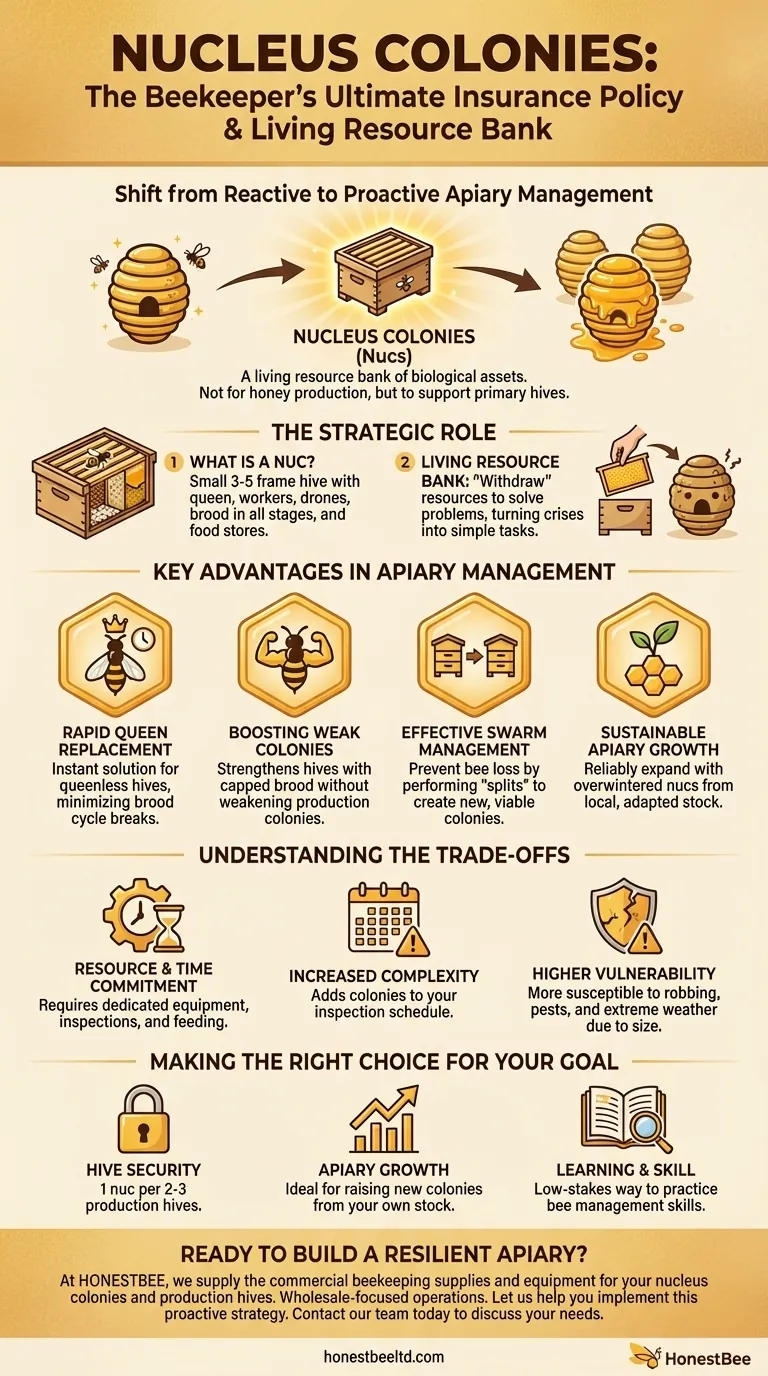
Related Products
- 5 Frame Wooden Nuc Box for Beekeeping
- Professional Galvanized Hive Strap with Secure Locking Buckle for Beekeeping
- No Grafting Queen Rearing Kit: System for Royal Jelly Production and Queen Rearing
- Nicot Queen Rearing Kit for Beekeeping and Grafting in Nicot System
- Jenter Queen Rearing Kit Complete Set for Bee Breeding
People Also Ask
- Why is it recommended to include a frame of capped brood in a new nuc? Boost Your Nuc's Success Rate
- What are the primary differences between using double nucs and single deep hives for overwintering bees?
- What is the function of mating hives in honey bee propagation? Boost Your Queen Rearing Efficiency
- What steps are involved in transferring frames from the nuc box to the hive? A Guide for a Smooth, Low-Stress Colony Move
- What information should be recorded on each nucleus? Track Queen Emergence and Genetics for Success
- When is the best time to create a nuc by splitting a full-size colony? Maximize Success in Late Spring
- How long does it take for a nucleus hive to establish and thrive? Achieve a Productive Colony in 8-12 Weeks
- How are nuc boxes used in the process of queen rearing? Boost Your Apiary's Queen Production Efficiency


